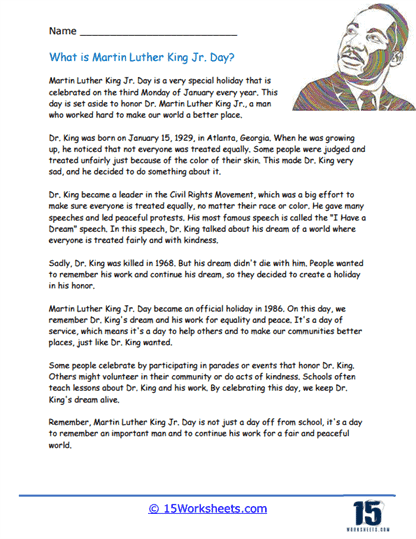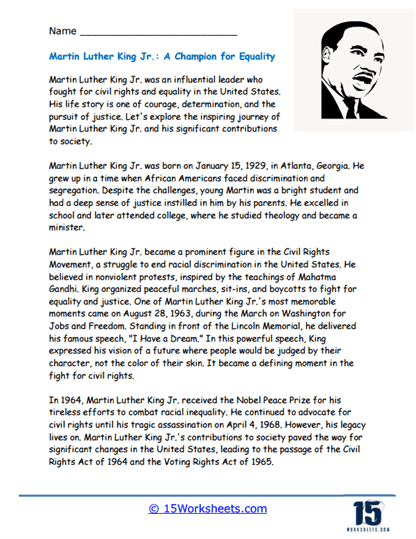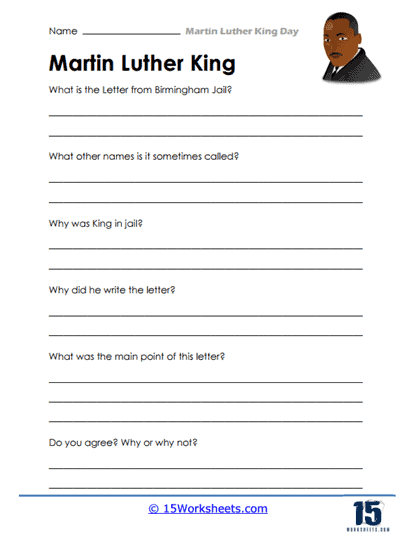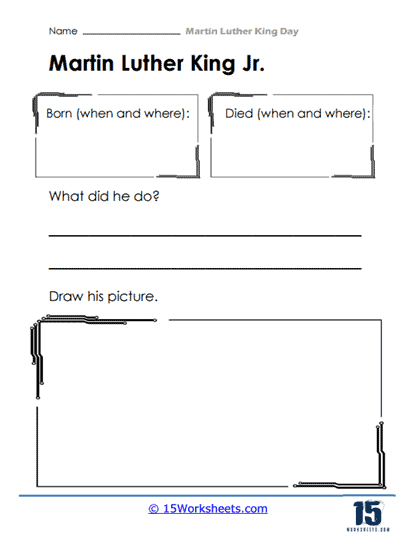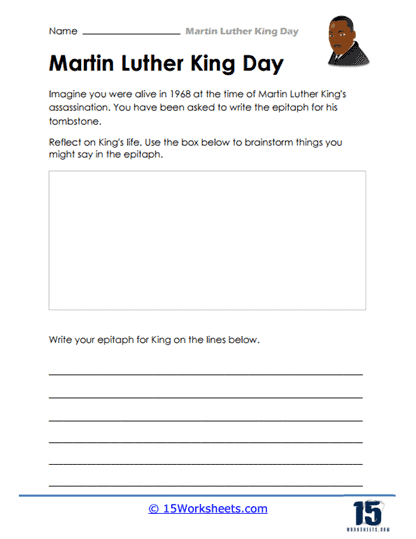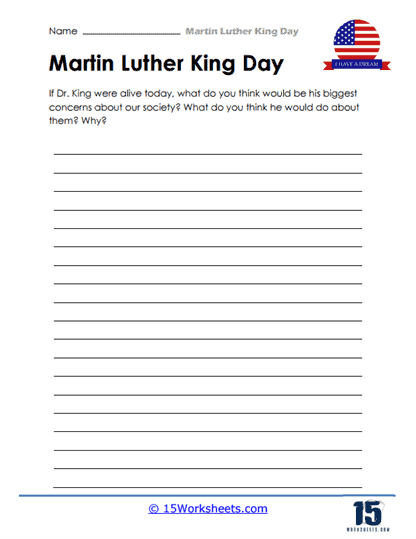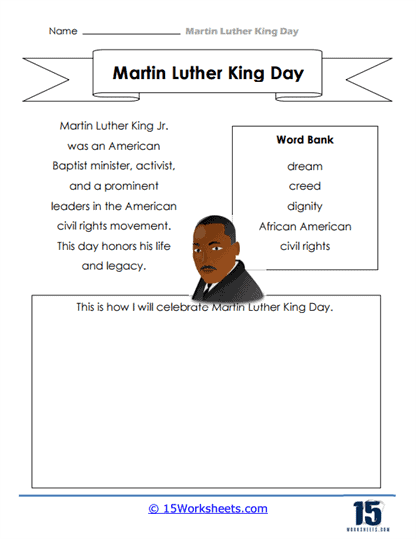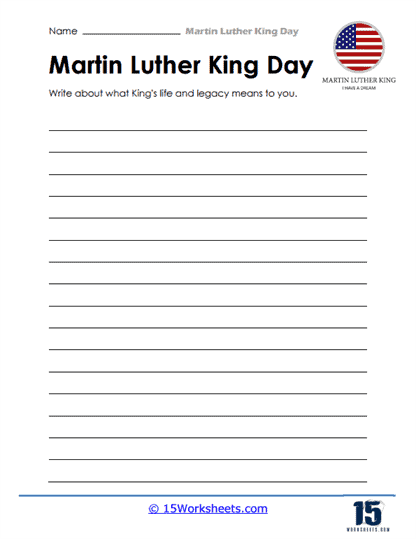Martin Luther King Jr. Day Worksheets
About These 15 Worksheets
These worksheets are used to teach students about the life, achievements, and legacy of Dr. Martin Luther King Jr., the prominent leader of the American civil rights movement. These worksheets are typically used around the holiday that commemorates his contributions, on the third Monday of January each year. They include a variety of exercises designed to engage students in learning about the history of civil rights in the United States and Dr. King’s role in that history. By using these worksheets, educators hope to foster a deeper understanding of the civil rights movement, its significance, and how it continues to impact society today.
They offer a range of activities that cater to different learning styles and objectives, from memorizing facts to engaging in deep reflection and discussion about social justice issues. By completing these exercises, students not only gain a better understanding of civil rights history but also develop skills and perspectives that are essential for active, informed citizenship.
Various types of exercises found on Martin Luther King Jr. Day worksheets include:
Reading Comprehension Passages – These passages provide information about Dr. King’s life, from his childhood to his role in the civil rights movement, including the Montgomery Bus Boycott, the March on Washington, and his famous “I Have a Dream” speech. Questions following the passages test students’ comprehension of the text.
Fill-in-the-Blanks – These activities reinforce key vocabulary and facts about Dr. King’s life and the civil rights movement. Students insert missing words into sentences or paragraphs, which helps in learning historical facts and concepts.
Word Searches – Students find words in a grid that are connected to the civil rights movement. This activity can serve as a vocabulary builder for key terms associated with civil rights.
Matching Activities – These exercises often involve pairing dates with events, quotes with their meanings, or laws with their descriptions. This helps students to understand the sequence and significance of historical events.
Critical Thinking Questions – Worksheets may present scenarios or problems that require students to apply their knowledge of civil rights principles to new situations, fostering higher-order thinking skills.
True or False Statements – These statements test students’ ability to discern factual information from common misconceptions about Dr. King and the movement he was part of.
Timeline Creation – Students may be asked to create timelines of major events in the civil rights movement, which helps them understand the chronological order of events and their cause-and-effect relationships.
Discussion Starters – These questions or statements prompt classroom discussion and encourage students to share their thoughts on civil rights issues and how they relate to current events.
What is Martin Luther King Jr. Day?
Martin Luther King Jr. Day is a special holiday celebrated in the United States to honor the life and achievements of an important leader named Dr. Martin Luther King Jr. He was a remarkable person who fought for equality and civil rights for African Americans.
Dr. Martin Luther King Jr. was born on January 15, 1929, and he became one of the most influential figures in American history. He believed in fairness, justice, and equality for all people, regardless of their skin color.
One of the most important things Dr. King did was to lead a peaceful movement called the Civil Rights Movement. He used nonviolent methods, like peaceful protests and speeches, to bring attention to the discrimination and unfair treatment that African Americans faced at that time.
Dr. King believed in the power of love, understanding, and unity. He wanted everyone to be treated equally, no matter their race or background. He dreamed of a world where people would be judged not by the color of their skin but by the content of their character.
On Martin Luther King Jr. Day, which is observed on the third Monday in January, we remember Dr. King’s life and work. It’s a day when we reflect on his message of peace, justice, and equality. We honor his legacy by promoting kindness, understanding, and respect for all people.
Many people celebrate Martin Luther King Jr. Day by participating in community service projects. They help others and make a positive difference in their communities, just like Dr. King did. Some people also attend special events or programs that teach about Dr. King’s life and the Civil Rights Movement.
Dr. King’s most famous speech, known as the “I Have a Dream” speech, is often quoted and remembered on this day. In this speech, he shared his dream of a future where everyone would live together harmoniously, regardless of their differences.
It’s important to understand that Martin Luther King Jr. Day is not just a day off from school or work. It’s a day to remember the struggles and sacrifices of Dr. King and the many others who fought for equality. It’s a time to reflect on how we can make the world a better place, just as Dr. King did.
So, on Martin Luther King Jr. Day, let’s remember the incredible work of this inspiring leader. Let’s be kind to one another, treat everyone with respect, and work together to create a world where everyone is treated equally and with dignity. Dr. King’s message of love and equality continues to inspire people of all ages to make a positive impact on the world.
Martin Luther King Jr. Trivia
- His birth name was Michael King Jr., but his father later changed both of their names to Martin Luther in honor of the German Protestant religious leader.
- Dr. King was greatly influenced by Mahatma Gandhi’s philosophy of nonviolence and peaceful resistance.
- His famous “I Have a Dream” speech was delivered during the March on Washington for Jobs and Freedom on August 28, 1963.
- Martin Luther King Jr. was the youngest person, at the age of 35, to receive the Nobel Peace Prize in 1964 for his efforts in combating racial inequality through nonviolent means.
- He led the Montgomery Bus Boycott in 1955, which successfully protested against racial segregation on public buses in Montgomery, Alabama.
- Dr. King was instrumental in organizing and leading the Selma to Montgomery marches in 1965, advocating for African Americans’ right to vote.
- Martin Luther King Jr. wrote a famous letter while he was jailed in Birmingham, Alabama, which became known as the “Letter from Birmingham Jail.” It expressed his views on nonviolent resistance.
- He co-founded the Southern Christian Leadership Conference (SCLC) in 1957, a civil rights organization focused on achieving equality through nonviolent protest.
- Dr. King delivered over 2,500 speeches, wrote several books, and penned numerous articles and essays during his lifetime.
- Martin Luther King Jr. was posthumously awarded the Presidential Medal of Freedom in 1977 and the Congressional Gold Medal in 2004.
- His efforts played a significant role in the passing of the Civil Rights Act of 1964 and the Voting Rights Act of 1965.

